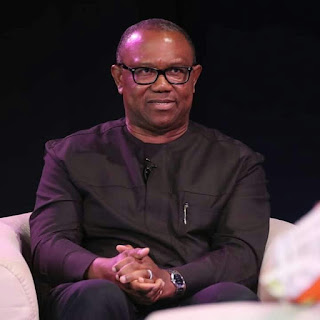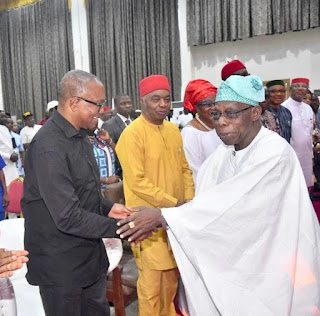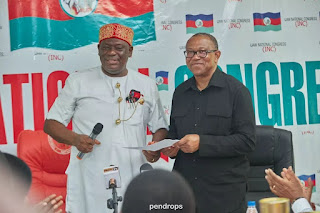Peter Obi Net Worth and History: How He Became One of Nigeria’s Richest Politicians
 |
| Peter Obi Net Worth and History: How He Became One of Nigeria’s Richest Politicians |
Peter Obi Net Worth and History: How He Became One of Nigeria’s Richest Politicians
Peter Obi is a Nigerian politician and businessman who has made a name for himself in both the corporate and political spheres. He is the former governor of Anambra State and the Labour Party presidential candidate in the 2023 election. But how did he achieve his success and wealth? What is his net worth and what are his sources of income? In this blog post, we will explore Peter Obi’s net worth and history, and reveal some interesting facts about his life and career.
Peter Obi’s Early Life and Education
Peter Obi was born on 19 July 1961 in Onitsha, Anambra State, Nigeria. He came from a devout Christian family and attended Christ the King College for his secondary education. He then proceeded to the University of Nigeria, Nsukka, where he graduated with a Bachelor of Arts (Hons) in Philosophy in 1984.
 |
| Peter Obi |
Obi was not satisfied with his academic qualifications and decided to pursue further studies at various prestigious institutions around the world. He completed the Chief Executive Program at Lagos Business School, and also studied at the London School of Economics, Harvard Business School, the International Institute for Management Development, and Columbia Business School. He acquired skills in executive leadership, marketing management, business policy, and financial management.
Peter Obi’s Business Career
Peter Obi started his business career at a young age, as he inherited his family’s business after his father’s death. He was involved in the importation of beverages and other commodities. He also ventured into banking and held several executive positions in different banks. Some of the banks he worked for include Fidelity Bank, Guardian Express Bank, Future View Securities, Paymaster Nigeria, Chams Nigeria, Data Corp Limited, Card Centre Limited, and Next International Nigeria.
Obi also invested in various sectors of the economy, such as oil and gas, real estate, hospitality, education, health care, agriculture, and manufacturing. He has stakes in several companies, such as Transcorp Hilton Hotel Abuja, Intafact Beverages Limited (a subsidiary of SABMiller), Seplat Petroleum Development Company Plc, Africa Prudential Registrars Plc, Dangote Sugar Refinery Plc, Fidelity Bank Plc, United Bank for Africa Plc (UBA), Guinness Nigeria Plc, among others.
 |
| Peter Obi |
Obi is also a philanthropist who has donated generously to various causes and institutions. He has supported schools, churches, hospitals, orphanages, and other charitable organizations. He has also sponsored scholarships for students and provided grants for entrepreneurs.
Peter Obi’s Political Career
Peter Obi entered politics in 2002 when he joined the All Progressives Grand Alliance (APGA), a regional party that advocates for the interests of the Igbo people. He contested for the governorship of Anambra State in 2003 but lost to Chris Ngige of the People’s Democratic Party (PDP). However, he challenged the election result in court and was declared the winner in 2006 after a long legal battle.
Obi assumed office as governor in March 2006 but was impeached by the state legislature in November the same year on allegations of gross misconduct. He appealed his impeachment and was reinstated by the Supreme Court in February 2007. He was removed again after the 2007 general election but was restored by another court ruling that affirmed his right to complete a four-year term. He was re-elected for a second term in 2010 with a landslide victory.
 |
| Peter Obi |
As governor, Obi implemented various policies and programs that improved the socio-economic development of Anambra State. He focused on education, health care, infrastructure, security, agriculture, commerce, and governance. He also maintained fiscal discipline and prudence, as he reduced wastage and corruption in public spending. He left office in 2014 with a record of good performance and popularity among the people.
After leaving office as governor, Obi defected to the PDP in 2014. He became an influential figure in the party and was selected as the vice presidential candidate of Atiku Abubakar in the 2019 presidential election. They ran against the incumbent president Muhammadu Buhari and vice president Yemi Osinbajo of the All Progressives Congress (APC). However, they lost the election by a wide margin.
Obi faced two main rivals in the 2023 presidential election: Bola Tinubu of the ruling All Progressives Congress (APC) and Atiku Abubakar of the opposition Peoples Democratic Party (PDP). Tinubu, a former governor of Lagos State and a powerful political godfather, had the backing of the incumbent president Muhammadu Buhari and his loyalists. Abubakar, a former vice president and a wealthy businessman, had the support of many former PDP governors and senators, as well as some influential religious and ethnic leaders.
 |
| Peter Obi |
Obi campaigned on a platform of economic reform, anti-corruption, youth empowerment, and national unity. He promised to diversify the economy away from oil dependence, create 10 million jobs in four years, reduce poverty and inequality, fight insecurity and terrorism, and restructure the federal system to give more autonomy to the states and regions. He also vowed to respect the rule of law, uphold human rights, and strengthen democratic institutions.
Obi appealed to many young and educated Nigerians who were disillusioned with the old political class and wanted a fresh alternative. He also gained popularity among the Igbo people of the south-east, who felt marginalized and discriminated against by the federal government. Obi was seen as a successful and prudent governor who transformed Anambra State during his tenure. He was also praised for his integrity, humility, and simplicity.
However, Obi faced many challenges and criticisms during his campaign. He was accused of being inexperienced in national politics, having no clear vision or agenda, and being a puppet of foreign interests. He was also attacked for defecting from the PDP to the LP, which was seen as a betrayal by some of his former allies. Moreover, he struggled to win support from other regions of the country, especially the north and the south-west, where Tinubu and Abubakar had strong bases.
 |
| Peter Obi |
The election was held on February 17, 2023. It was marred by violence, intimidation, vote-buying, ballot-box snatching, and irregularities. The Independent National Electoral Commission (INEC) declared Tinubu as the winner with 55% of the votes, followed by Abubakar with 35%, and Obi with 10%. The LP and several other opposition parties rejected the results and filed petitions at the Presidential Election Tribunal, alleging massive fraud and rigging. However, their petitions were dismissed by the tribunal on October 26, 2023. The Supreme Court also upheld Tinubu’s victory on November 15, 2023.
Obi accepted the verdict of the court and congratulated Tinubu on his victory. He thanked his supporters for their faith and courage and urged them to remain peaceful and hopeful. He said he would continue to serve Nigeria in whatever capacity he could and work for the common good of all Nigerians. He also called for national reconciliation and dialogue to address the challenges facing the country.








Leave Comments
Post a Comment